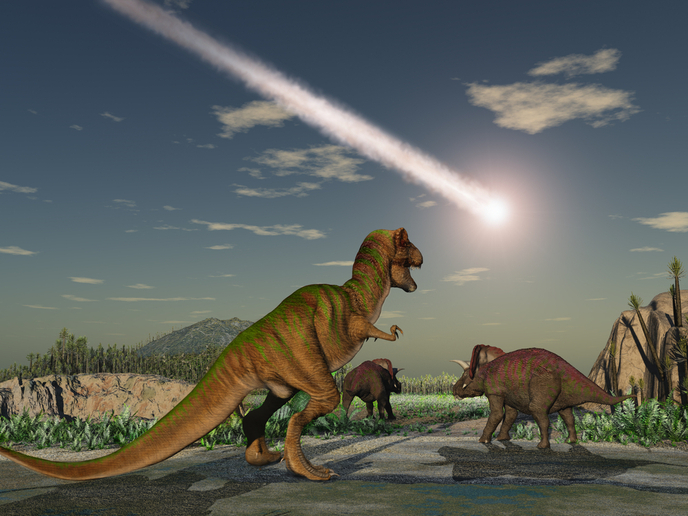TRENDING SCIENCE: An asteroid, not volcanoes, wiped out the dinosaurs, new study finds
It wasn’t massive volcanic eruptions but an asteroid the size of a city that drove dinosaurs to extinction, according to research published in the journal ‘Proceedings of the National Academy of Sciences’(opens in new window). Most scientists agree that the asteroid triggered the extinction event, wiping out almost 75 % of life on Earth. The question is whether volcanoes in modern-day India known as Deccan Traps also contributed to the dinosaurs’ demise. “The relative roles of these two potential kill mechanisms on the timing and magnitude of the extinction have been fiercely debated for decades,” the study said.
What made Earth unliveable for dinosaurs?
A team of researchers from Imperial College London, the University of Bristol and University College London provide a new twist to the volcano-versus-asteroid debate. By using mathematical models to recreate Earth’s prehistoric climate and adjusting the variables of different apocalyptic scenarios, they claim that volcanic activity in fact helped life recover from the asteroid strike. The simulations show that the asteroid made the planet uninhabitable for all dinosaurs except birds. While the asteroid left only destruction in its wake, the volcanoes left some habitable areas. “In one day, in a blink of a geologic eye, everything ended for them,” lead author Dr Alfio Alessandro Chiarenza told ‘CNN’(opens in new window). Only an event the magnitude of an asteroid impact could have created conditions that made the planet unfit to live. A blocked Sun caused permanent winter. The volcanic eruptions likely helped warm the planet after years of devastating darkness and cold. “We show that only the asteroid impact, particularly with its prolonged consequences, was the real driver of the extinction,” commented Dr Chiarenza, who led the study while studying for his PhD at Imperial College London. “Could it (the volcanic activity) have played a smaller role by making it harder for dinosaurs to thrive prior to the asteroid impact? No, we show that Deccan Traps activity, if anything, might have buffered the ‘negative effects’ of the impact on climate, potentially boosting the recovery after the extinction event.”
Did climate change kill the dinosaurs?
Dr Chiarenza further explains in an Imperial College London news release(opens in new window): “We show that the asteroid caused an impact winter for decades, and that these environmental effects decimated suitable environments for dinosaurs. In contrast, the effects of the intense volcanic eruptions were not strong enough to substantially disrupt global ecosystems.” He continues: “Our study confirms, for the first time quantitatively, that the only plausible explanation for the extinction is the impact winter that eradicated dinosaur habitats worldwide.” Co-author Dr Philip Mannion adds: “In this study we add a modelling approach to key geological and climate data that shows the devastating effect of the asteroid impact on global habitats. Essentially, it produces a blue screen of death for dinosaurs.” “We provide new evidence to suggest that the volcanic eruptions happening around the same time might have reduced the effects on the environment caused by the impact, particularly in quickening the rise of temperatures after the impact winter,” concludes Dr Chiarenza. “This volcanic-induced warming helped boost the survival and recovery of the animals and plants that made [it] through the extinction, with many groups expanding in its immediate aftermath, including birds and mammals.”



